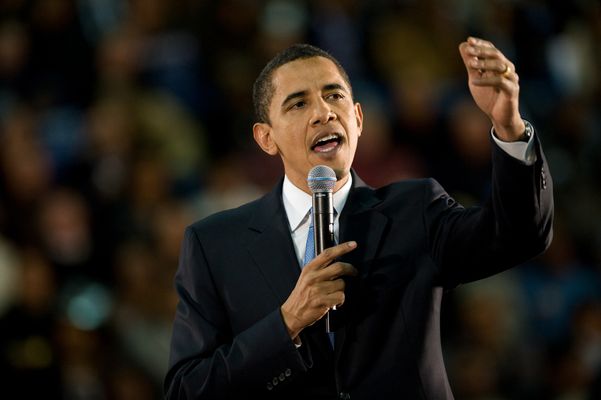2.4.3
Factors Affecting Party Success
Party Factors Affecting Election Success
Party Factors Affecting Election Success
The party leader, party policies and the election campaign will impact a party's success.


Party leader
Party leader
- The party leader represents the party and many voters view the leader as the image of the party.
- Public opinion of the leader and their ability to offer an appealing brand to the electorate plays an important role in creating support for the party.


Party leader: charisma
Party leader: charisma
- A leader’s personality, charisma and popularity among voters is important.
- Nigel Farage was viewed as the image of UKIP and his charisma played a role in UKIP’s appeal to voters.
- Since Farage stepped down as the leader, UKIP has not achieved the same electoral success.
- Tony Blair was popular beyond traditional Labour voters.
- Blair's personality and charisma had wide appeal, which were important in the success of New Labour from 1997.


Party leader: uniting the party
Party leader: uniting the party
- Party leaders unite the party, which is important because party supporters may come from a range of groups in society.
- More divided parties struggle to win elections and appeal to voters.
- The Labour Party is divided under Jeremy Corbyn, who faced a vote of no confidence in 2016.
- The Conservative Party is divided over the issue of leaving the EU.


Party leader: funding
Party leader: funding
- Party leaders play a role in gaining party funding, which is crucial as greater resources can mean the ability to run a stronger election campaign.
- Theresa May held dinners for donors to increase funding for the Conservative Party.


Election campaigns
Election campaigns
- The election campaign tells the public about party policies, the personality of the leader, and how the party behaves under pressure.
- For example, Ed Miliband was seen to be a weaker leader than David Cameron, because of problems in the election campaign.
- But, studies have shown that voters already know who they will choose before the election campaign, so the election may not always change minds.


Policies
Policies
- Party policies are important to gather support.
- Change in party policies can gather new voters.
- In 1997, after Labour rebranded to ‘New Labour’ under Tony Blair, they achieved their biggest general election victory.
The Media & External Events
The Media & External Events
How a party is portrayed in the media, the impact of external events, and how a politician responds to them affects how well a party does.


The media
The media
- The media provides the means by which the electorate can access information on parties.
- Different media outlets support different parties and encourage readers to vote in certain ways.
- The Daily Mail is a right-wing paper. The paper supported Brexit in the 2016 referendum
- The Guardian is a centrist/left-leaning newspaper. Some Jeremy Corbyn supporters have accused the paper of being biased against the Labour leader.
- The BBC is funded by taxpayers and is supposed to be unbiased.


External events
External events
- How parties respond to external events (ie outside of UK politics and goings-on in Westminster) may impact their support.
- Terror attacks, world politics and protests may all be commented on and responded to by major parties.
- If a party responds in an unpopular way, this may impact their support.
1Democracy & Participation
1.1Representative & Direct Democracy
1.2Wider Franchise & Suffrage
1.3Pressure Groups & Other Influences
2Political Parties
2.1How Political Parties Work
2.2Established Political Parties
2.3Emerging & Minor Political Parties
3Electoral Systems
3.1Different Electoral Systems
3.2Referendums & How They Are Used
4Voting Behaviour & the Media
5Conservatism
5.1Conservatism: Core Ideas & Principles
5.2Conservatism: Differing Views & Tensions
6Liberalism
6.1Liberalism: Core Ideas & Principles
6.2Differing Views And Tensions Within Liberalism
7Socialism
7.1Socialism: Core Ideas & Principles
7.2Differing Views And Tensions Within Socialism
8The UK Constitution
8.1Nature & Sources of UK Constitution
8.2Constitutional Change since 1997
8.3Role & Powers of Devolved UK Bodies
9The UK Parliament
9.1Houses of Parliament
9.2Comparative Powers
9.3Legislative Process
10The Prime Minister & the Executive
10.1The Executive
10.2Ministerial Responsibility
10.3Prime Minister & the Cabinet
10.3.1Role of the Prime Minister
10.3.2Prime Minister's Powers
10.3.3Limits on the Prime Minister's Powers
10.3.4Role of the Cabinet
10.3.5Prime Minister & Cabinet: Relations
10.3.6Prime Minister & Cabinet: Balance of Power
10.3.7Prime Minister & Cabinet: Case Studies
10.3.8End of Topic Test - PM & Cabinet
10.3.9Top Grade AO3/4 - PM & Cabinet
11Relationships Between Government Branches
11.1The Supreme Court
11.2Parliament & Executive Relations
11.3The European Union & the UK
11.4Sovereignty in the UK Political System
12US Constitution & Federalism
12.1Nature of the US Constitution
12.2Principles of the US Constitution
12.3Federalism
13US Congress
13.1Structure of Congress
13.2Functions of Congress
14US Presidency
14.1Presidential Power
14.2The Presidency
14.3Interpretations & Debates of the US Presidency
15US Supreme Court & Civil Rights
15.1Nature & Role of Supreme Court
15.2Supreme Court Appointment Process
15.3The Supreme Court & Public Policy
15.4Protection of Civil Liberties & Rights
15.5Debates & Interpretations of the Supreme Court
16US Democracy & Participation
16.1Presidential Elections
16.2Electoral College
16.3Electoral Campaigns
16.4Incumbency
16.5Democrats & Republicans
16.6Internal Conflict & Ideology
16.7Support & Demographics
17Comparing Democracies
17.1Theoretical Approaches
17.2UK & USA Similarities & Differences
17.2.1Constitution: Nature
17.2.2Constitution: Provisions & Principles
17.2.3Federal System & Devolution
17.2.4Legislative: Lower Houses of Government
17.2.5Legislative: Upper Houses of Government
17.2.6Legislative: Powers & Functions
17.2.7Executive
17.2.8Supreme Court
17.2.9Supreme Court: Judicial Independence
17.2.10Civil Rights
17.2.11Civil Rights: Interest Groups
17.2.12Party Systems & Parties
17.2.13Campaign Finance & Pressure Groups
17.2.14End of Topic Test - Comparing UK & US
17.2.15Application Questions - UK & USA
18Feminism
18.1Feminism: Core Ideas & Principles
18.2Different Types of Feminism
19Nationalism
19.1Nationalism: Core Ideas & Principles
19.2Different Types of Nationalism
Jump to other topics
1Democracy & Participation
1.1Representative & Direct Democracy
1.2Wider Franchise & Suffrage
1.3Pressure Groups & Other Influences
2Political Parties
2.1How Political Parties Work
2.2Established Political Parties
2.3Emerging & Minor Political Parties
3Electoral Systems
3.1Different Electoral Systems
3.2Referendums & How They Are Used
4Voting Behaviour & the Media
5Conservatism
5.1Conservatism: Core Ideas & Principles
5.2Conservatism: Differing Views & Tensions
6Liberalism
6.1Liberalism: Core Ideas & Principles
6.2Differing Views And Tensions Within Liberalism
7Socialism
7.1Socialism: Core Ideas & Principles
7.2Differing Views And Tensions Within Socialism
8The UK Constitution
8.1Nature & Sources of UK Constitution
8.2Constitutional Change since 1997
8.3Role & Powers of Devolved UK Bodies
9The UK Parliament
9.1Houses of Parliament
9.2Comparative Powers
9.3Legislative Process
10The Prime Minister & the Executive
10.1The Executive
10.2Ministerial Responsibility
10.3Prime Minister & the Cabinet
10.3.1Role of the Prime Minister
10.3.2Prime Minister's Powers
10.3.3Limits on the Prime Minister's Powers
10.3.4Role of the Cabinet
10.3.5Prime Minister & Cabinet: Relations
10.3.6Prime Minister & Cabinet: Balance of Power
10.3.7Prime Minister & Cabinet: Case Studies
10.3.8End of Topic Test - PM & Cabinet
10.3.9Top Grade AO3/4 - PM & Cabinet
11Relationships Between Government Branches
11.1The Supreme Court
11.2Parliament & Executive Relations
11.3The European Union & the UK
11.4Sovereignty in the UK Political System
12US Constitution & Federalism
12.1Nature of the US Constitution
12.2Principles of the US Constitution
12.3Federalism
13US Congress
13.1Structure of Congress
13.2Functions of Congress
14US Presidency
14.1Presidential Power
14.2The Presidency
14.3Interpretations & Debates of the US Presidency
15US Supreme Court & Civil Rights
15.1Nature & Role of Supreme Court
15.2Supreme Court Appointment Process
15.3The Supreme Court & Public Policy
15.4Protection of Civil Liberties & Rights
15.5Debates & Interpretations of the Supreme Court
16US Democracy & Participation
16.1Presidential Elections
16.2Electoral College
16.3Electoral Campaigns
16.4Incumbency
16.5Democrats & Republicans
16.6Internal Conflict & Ideology
16.7Support & Demographics
17Comparing Democracies
17.1Theoretical Approaches
17.2UK & USA Similarities & Differences
17.2.1Constitution: Nature
17.2.2Constitution: Provisions & Principles
17.2.3Federal System & Devolution
17.2.4Legislative: Lower Houses of Government
17.2.5Legislative: Upper Houses of Government
17.2.6Legislative: Powers & Functions
17.2.7Executive
17.2.8Supreme Court
17.2.9Supreme Court: Judicial Independence
17.2.10Civil Rights
17.2.11Civil Rights: Interest Groups
17.2.12Party Systems & Parties
17.2.13Campaign Finance & Pressure Groups
17.2.14End of Topic Test - Comparing UK & US
17.2.15Application Questions - UK & USA
18Feminism
18.1Feminism: Core Ideas & Principles
18.2Different Types of Feminism
19Nationalism
19.1Nationalism: Core Ideas & Principles
19.2Different Types of Nationalism
Unlock your full potential with Seneca Premium
Unlimited access to 10,000+ open-ended exam questions
Mini-mock exams based on your study history
Unlock 800+ premium courses & e-books

Social & Regional Factors Affecting Party Success
Various social and regional factors affect who votes for which party. As social factors change over time, how well a party does in an election may change.
Class
Age
Ethnicity
Region
Family